The Lark Read online
Page 2
‘Of course not,’ she agreed; ‘that would be dreadfully shocking. I quite see that, darling. But just to begin with – till you bring off your first great invention – so that your mind could be quite free for wheels and cogs and springs and strains and levers and things. Then afterwards, when your royalties begin to come in, you could repay her a thousandfold for any little help she’d been able to give you.’
‘You’ve thought it all out very thoroughly, and you put it very convincingly,’ he said, and laughed again. ‘But when I marry, my dear mother, I think it would be more interesting to be in love with my wife.’
‘Then I’m afraid you’ll never marry,’ she said very gravely. ‘You’re twenty-five, and you’ve never been in love yet.’
‘You can’t possibly know that,’ he said quickly. And still more quickly she answered:
‘You can’t possibly deny it.’
He could not, it was true. There seemed to be nothing to do but to laugh again. So he laughed. Then he said:
‘Then the time must soon come when I shall.’
‘I don’t think so,’ said his mother, speaking as one who knows. ‘Your dear father once told me he had never been in love in his life. Of course, he led me to believe otherwise when we first became engaged, and it is true that he was in one of his tempers when he said it. But it was true for all that. I knew it was true before he said it, if you understand, only until he said it I didn’t know I knew it.’
She got up rather hurriedly and walked to the window, and stood swinging the little ivory acorn that held the knob of the blind-cord. ‘You see, dear, I could always tell when he was telling the truth. He didn’t always, I am sorry to say. No, you needn’t say, “Poor mother”. We were quite as happy as most people. Marriages aren’t really unhappy when one of the people is kind and the other is loving. And I was quite fond of him. And in the marriage I hope you’ll make there’ll be plenty of love on one side at least.’
‘Mother, don’t.’
‘I’m quite sure of what I say.’ She turned and faced him, and her face showed sharp and old under her powder. ‘You’re exactly like your father. Your face, your voice, your foot-step, your temper – even that aggravating way you have of tilting your chair …’
The chair went down with a bang.
‘There are some men who never fall in love. But they need companionship and a home. And here’s a really good nice girl who worships the ground you walk on.’
‘Nonsense!’ he put in, and almost felt as though he were blushing.
‘Well, judge for yourself. Now I’ve told you, you can judge. You can make this nice girl happy and make yourself comfortable for life. Now don’t say anything. All I want you to promise me is that you’ll think it over. No, don’t say anything. Don’t speak. Think. Think hard. You’ll never find a wife more suited to you in every way than Hilda Antrobus.’
‘Hilda Antrobus! –’ he was beginning, but she came swiftly to him and put her hand over his mouth. A soft little hand, adequately ringed and scented with lavender.
‘Not a word; just promise me you’ll think it over. And when you see her, notice. She’ll be there to-day.’
‘Oh Lord!’ said John Rochester, looking towards the door.
‘Say you’ll think it over.’
‘You haven’t said anything to her about it?’
‘My darling boy! As if I should! Now just promise to think it over.’
‘Oh, very well, I’ll think it over all right,’ he said. ‘And now let’s drop it, shall we?’
‘By all means – not another word!’ she answered. ‘You’re a dear, good, clever boy, and you deserve to be happy, if ever a boy did, and if you and that nice Hilda …’
But he had escaped.
He did not mean to think it over. But he found that he could think of nothing else; and when on the lawn at Hendon Towers among the moving kaleidoscope of strangers he suddenly met Miss Antrobus, and saw the quite pretty blush and smile that lighted the quite plain face of Miss Antrobus as she greeted him, he felt that he had never really seen the girl before. Suppose he actually were like his father, in that respect as in others? Suppose he were the sort of man who cannot ever fall in love, and who yet wanted a home, companionship – leisure too (that thought would slip in)? Supposing Hilda really cared? … Why then … why then …
Supposing she really cared? The thought touched him oddly. He had never been in love with any woman, but he had been, for long enough, in love with love. He knew well enough what love must be; and if this girl cared … why, then, he could make her happy, make his mother happy, and set free that caged bird in him that year in and year out beat its wings against the constraining bars of an enforced activity that was not the activity he longed for, but one enforced by circumstances and the will of others. If only the inventive genius that he felt penned in him could take free flight! Marrying for money had not a pleasant sound, but this would be marrying for freedom and happiness – his freedom, her happiness, and, perhaps in the end, his own. To this her money would be a means. It would never be an end in itself. That was where baseness would have been.
Under the influence of these sentiments he found himself smiling kindly at Miss Antrobus in her simple, expensive dress of unbecoming blue silk, and saying, ‘How jolly to meet you here!’
It was the tenderest speech he had ever made to her; and, having made it, he could think of nothing else to say. A fleeting wonder crossed his mind: what would it be like to sit at table for half a lifetime, opposite a woman to whom one could think of nothing to say? But she herself was speaking.
‘It is nice to see you,’ she said; ‘and what a beautiful day, too!’
The naïveté of her words touched him again.
‘Come,’ he said, ‘let’s get away from the crowd and explore. Do you know your way about?’
‘I’m staying here,’ she said. ‘Come and see the ruins. Oh, they’re not real ruins, but Lord Hendon thought they’d look pretty. And they do. I shouldn’t like antiquarians and people like that to hear me say so; but they do, especially now the ivy’s growing so nicely. Come and look.’
They moved off. It was the happiest moment she had ever known.
Later in the day Miss Antrobus and Mrs Rochester found themselves together on the slope of the beech wood. There is a wooden seat here from which you look out across the Kentish valley to the blue of the hills beyond. Away to the right was the house, its lawns gay with the many-coloured patchwork of the guests.
‘Well, dear?’ said the elder woman; her voice was both very gentle and very alert.
‘Well?’ said the girl awkwardly.
‘He’s been paying you a good deal of attention, hasn’t he? You seem to have been a good deal together.’
‘He has been very kind,’ said Miss Antrobus, and put her gloved fingers to her burning cheeks. ‘Dear Mrs Rochester – I feel so ashamed. I wish you’d never found it out.’
‘Why should you be ashamed?’ purred Mrs Rochester suavely. ‘I can only be proud that you care for my boy. And I know he likes you very much. And he has never cared for anyone else.’
‘You haven’t said anything to him about it?’ the heiress asked with quick suspicion.
‘My darling girl! As if I should,’ the mother answered earnestly. ‘He’s very … well, not exactly shy – and modest isn’t exactly the word either. I mean he’s not vain – he’s not the sort of man who would think he could carry all before him; not one of our conquerors, you know. He’ll need encouraging. No – I don’t mean exactly that, but I don’t think you ought to disguise from him that you like him.’
‘I don’t, really I don’t,’ said Miss Antrobus, not knowing at all how truly she spoke.
‘That’s right; and don’t let me see tears in those pretty eyes – there’s nothing to be sad about. Life’s just beginning for you, and I’m certain it will be a beautiful life, full of love and happiness.’
‘You are good to me,’ said the girl, and her tears brimmed o
ver. She pulled out her handkerchief.
‘Dab your eyes, dearest,’ said Mrs Rochester hastily, ‘don’t rub. It makes them red. If you gently dab, those tears will only make them brighter.’
‘You are good to me,’ said Miss Antrobus, dabbing obediently at her red-rimmed wet pale blue eyes. And for the rest of the day his mother’s words rang in her ears: ‘Your pretty eyes. Your pretty eyes.’
John Rochester walked from Hendon Towers to the station. He walked through the woods, partly because the way was shorter and partly because it was quieter. Motors hooted and stank along the high road, and he had no fancy for being pursued by goggled acquaintances offering lifts. The way through the wood was shorter, but it was also sinuous. He missed his way, and, as a direct consequence, missed his train. He saw it coming, ran, saw it retreat, and arrived at the station with just enough breath left to say ‘Damn!’
The porters were sympathetic. Yes, that was the last train. And the Lechmere Arms was quite handy. Very good beds, they believed. Oh, the gentleman wanted to be in London early in the morning? Well, there was a goods train at 3.15, if the gentleman didn’t mind travelling in the guard’s van? The gentleman did not? Good; that would be all right then, and thank you very much sir, they were sure.
Rochester walked out of the station. He had no intention of returning to his mother’s house. Miss Antrobus, who that morning had been little more than a name and a face to him, was now a person whom he did not want to discuss with his mother or anyone else. He was beginning to like her; he felt that some day he might begin to feel affection for her. She was a straightforward, simple little soul. Not at all a bad sort.
And he knew now that she did care; which gave one quite a different feeling for her. He had felt nothing but a sort of awkwardness when his mother had told him this. But now that Miss Antrobus had told him with her own face and voice, and the light that shone in them at his presence, things were quite otherwise.
He would go back into the woods and think, perhaps rest on that thick moss under the big beech trees. The woods would be very beautiful under this rising moon. The night was hot, the roads dusty; the woods would be sweet and fresh. He got over the stile and passed under the arch of hazel and sweet chestnuts. The moonlight dappled the grassy ride ahead of him. The cool, fresh leaves brushed now and then against his hands. He did not sit down; he walked on thinking, thinking. And all his thoughts were of the ingenuous heiress to whom till now he had never given a thought. Yes, one might grow quite fond of her; he was sure of it. And the conviction seemed to wash him clean of sordid soil which the idea of ‘marrying for money’ does beyond doubt bring with it. Supposing one grew to be honestly fond? He walked on, bareheaded, through the dew and the moonlight, keeping now to the straight rides and essaying no by-paths.
How still the wood was; how dark in its shadows; how greenly silver where the moonbeams touched it! Peace wrapped him like a cloak; perhaps love ought to be like that – quiet, unchanging affection, a community of interests, mutual kindness … none of that wild unrest, that passion of longing, that triumph of possession which men call love … but just mutual kindness – peace. He seemed to be learning much.
‘Everything seems to be deciding itself here,’ he said, sinking deeper into the peace of those silent, moonlit woods.
And then suddenly he saw a light that was not moonlight – a mellow, yellow light deepening to orange. It was not the light from any house windows, it was too diffused. It was not the light of the festal illuminations at the Towers, it was too near. What we call idle curiosity turned his feet towards it. It gleamed through the leaves, almost vanished, reappeared. He made straight for it through the wood; briars tore at him, hazel switches stung hands and face; he pressed on, only to be checked at last by an oak fence. He vaulted it; and now were no more brambles, but smooth green sward under his feet; and no close-clinging woods, but space, set with trees and bushes in groups. He went towards the light, but cautiously, for he perceived that he was not now in a place where any and every one had a right to be. Under cover of a clump of huge rhododendron he drew quite near to the light, parted very carefully and silently the resilient boughs and peered through.
He saw a glade, ringed round with rhododendrons and azaleas, their big heads of bloom glistening in the wan light cast from the Japanese lanterns that hung like golden incandescent fruit from the branches of the fir-trees. In the middle of the glade a ring of fairy lights shining like giant glow-worms were set out upon the turf.
In the middle of the ring stood a girl, slender, still, silent. Her gown was white and straight and reached to her feet; her white, elfish face was set with stern resolution. On her dark hair shone a crown of starry golden flowers. On her faintly moulded breast lay a kindred blossom; two more golden star-flowers she held in her hands. She stood there, silent. There was no one else. Among the trees under the moon he and she were alone together.
He held his breath. A dull, heavy, resonant, metallic sound startled his heart to a quick fluttering. The repetition of the sound reassured him. It was the clock of Lechmere Church beating out the hour – midnight.
The sound had startled the girl-child within the ring of fairy lights. The resolution of her face broke up into fear that rippled quickly into something like the shadow of a smile. Then she stood listening, and, as the echo of the last bell-beat died away, she began to speak. Plain and distinct, her words came to him in the clearest, finest, most charming voice in the world.
‘O, good Saint John, now condescend
For to be a maiden’s friend.
On your feast a maid stands here
With your weed in breast and hair.
Good Saint John, now to me show
Portents plain of weal or woe.
If I am to die a maid,
Let white flowers be round me spread;
But if I a bride shall be,
Let me now my true love see.’
The voice ceased, and then, ‘Oh!’ it said, with an indescribable inflection. Fear, surprise, pride, joy, and something else mingled in it. Then there was silence. She stood like a young fawn at gaze. And her eyes met his. For, as she had spoken her spell, he, in listening, had forgotten caution and had let his face pass the guard of the shining leaves and blossoms. So that now they stood looking at each other across the green sward and the little green lights. Her eyes were wide with wonder, and beautiful with the light of dreams come true. Still as a statue she stood, in her white robe and her golden garland. It was he who moved first. Slowly he drew back, slowly the leaves closed between his face and hers. Yet he could still see her, but she could no longer see him.
And when she could no longer see him the charm broke that had held her moveless. She put her hands to her head, drew a long breath, and called aloud:
‘Emmy, Emmy, quick!’
And at that there was a sound of running footsteps, and almost at once two other girls came flying down the hill into the glade and ran to her. She clung to them without words.
‘There,’ said one, with soothing voice and gentle pattings, ‘you’ve frightened yourself to death – I knew you would.’
But the other said, ‘She has seen something.’
Then said the first, ‘You promised to tell.’
‘I will tell,’ said the girl with the starry flowers and the starry eyes, and freed herself. ‘I’ve seen him,’ she said in a strange little clear voice.
‘You haven’t! What was he like?’
‘Like a … I don’t know … not like anyone real. Like a Greek god …’ said the child with the gold-flower crown.
And at that Rochester drew back and fled very quickly and quietly across the dewy turf.
He had meant to disclose himself, to beg pardon for his involuntary trespass, to scatter the mists of magic and bring everything back to the nice, sensible, commonplace that frightens no one – but he could not do it now. No man could. What man could walk out of a clump of rhododendrons at midnight into a magic circle of little green
lamps and say, in cold blood, to a group of schoolgirls: ‘I am the Greek god to whom this lady has referred’? It was impossible. The only thing he could do was to go away as quietly and as quickly as might be. He crept along the fence till he found a narrow swing gate and squeezed through it. Then he looked back. The golden lights were gone. All was moonlight and silence. The whole thing might well have been a dream. To all intents and purposes it was a dream. He did not know who the girl was into whose eyes he had gazed – who had gazed into his and thought him a god. He probably would never know, would never see her again.
‘Certainly I shall never see her again,’ he said. He also said: ‘But I will never marry Miss Antrobus.’
CHAPTER II
Jane Quested was a schoolgirl when the war began, and she was a schoolgirl when it ended. So was her cousin Lucilla. Explanations are tiresome, but inevitable. Even on the stage people draw their chairs together, and one tells the other – for your benefit – what both of them must know perfectly well, beginning, probably: ‘It was just such a stormy night as this, twenty years ago, my dear wife, when that mysterious stranger …’ or ‘I often think of the secret marriage of the Duchess, when you and I – I her butler and you her maid – were sworn by Her Grace to eternal secrecy. The circumstances, you will remember, are these …’ And then he tells you all about it. As I will now tell you. So let us face the explanations, which are really short and simple.
Jane Quested’s father, who was also Lucilla’s uncle, was in India. He had nothing but his pay, which he found insufficient. A great-aunt had left Jane quite a pleasant little fortune – nothing dazzling, but enough to keep the wolf from the door of a reasonably prosperous home. This little fortune, in charge of a trustee, a solicitor, was tied up and secured by all those arts and crafts which lawyers could devise and execute to protect it from impecunious fathers. It was to be Jane’s when she reached the age of reason as defined by law. To Lucilla the same relative had left the same competence.
When war broke out the cousins were at school in Devonshire, and to both father and trustee it seemed desirable that they should stay there for the duration of the war. The father had no wish that his daughter should undertake a long and perilous journey merely to embarrass him in his Eastern housekeeping – and, to the trustee, school seemed, for a thousand reasons, the best place for Lucilla and Jane. So at school they had stayed, and knitted socks and sweaters for the army and navy, and heard selections from the papers read aloud by careful governesses, seeing and hearing as little of the war as any English-speaking young women in the world. Of course they thrilled at our disasters, triumphed in our successes, pitied and prayed for the poor soldiers and sailors, execrated our enemies, and idealised our Allies. But it was all to them very far away; it hardly came near them, never touched them, till Jane’s father died like a hero in Mesopotamia, leaving her his heroism to glorify her sorrow. Even then it was only as though an echo of the thunder of the waves of war had somehow reached the quiet, ordered house in Devonshire.

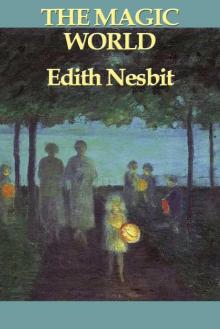 The Magic World
The Magic World In the Dark
In the Dark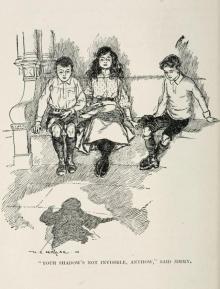 The Enchanted Castle
The Enchanted Castle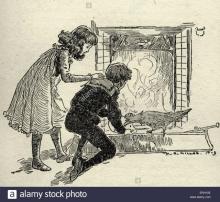 The Phoenix and the Carpet
The Phoenix and the Carpet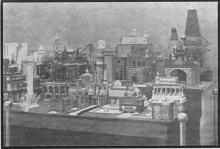 The Magic City
The Magic City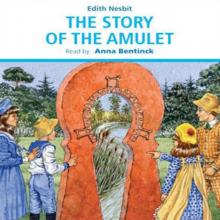 The Story of the Amulet
The Story of the Amulet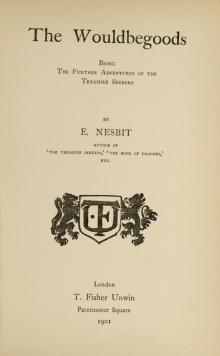 The Wouldbegoods: Being the Further Adventures of the Treasure Seekers
The Wouldbegoods: Being the Further Adventures of the Treasure Seekers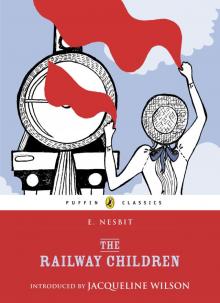 The Railway Children
The Railway Children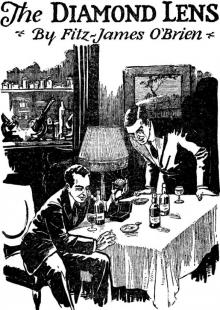 The Diamond Lens
The Diamond Lens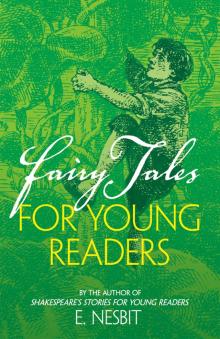 Fairy Tales for Young Readers
Fairy Tales for Young Readers Shakespeare's Stories for Young Readers (Dover Children's Classics)
Shakespeare's Stories for Young Readers (Dover Children's Classics) The Wouldbegoods
The Wouldbegoods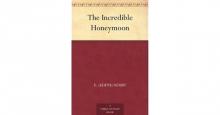 The Incredible Honeymoon
The Incredible Honeymoon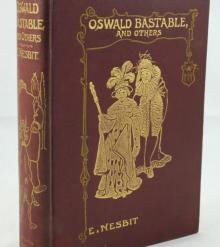 Oswald Bastable and Others
Oswald Bastable and Others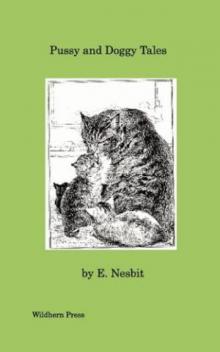 Pussy and Doggy Tales
Pussy and Doggy Tales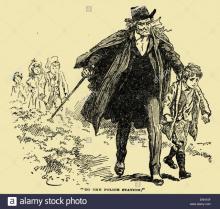 New Treasure Seekers; Or, The Bastable Children in Search of a Fortune
New Treasure Seekers; Or, The Bastable Children in Search of a Fortune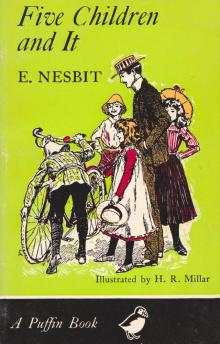 Five Children and It
Five Children and It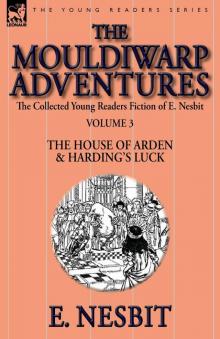 Harding's luck
Harding's luck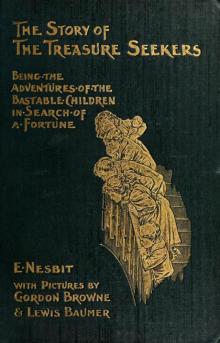 The Story of the Treasure Seekers
The Story of the Treasure Seekers The E. Nesbit Megapack: 26 Classic Novels and Stories
The E. Nesbit Megapack: 26 Classic Novels and Stories Shakespeare's Stories for Young Readers
Shakespeare's Stories for Young Readers